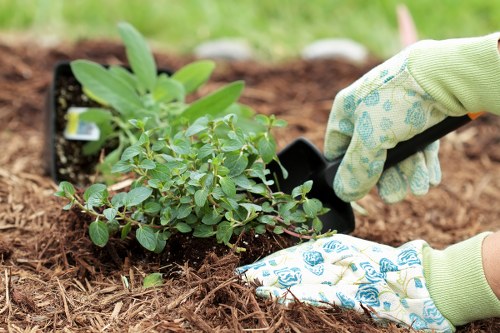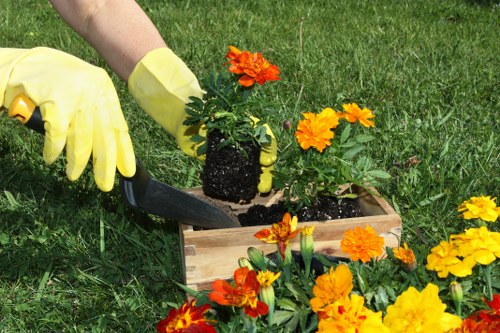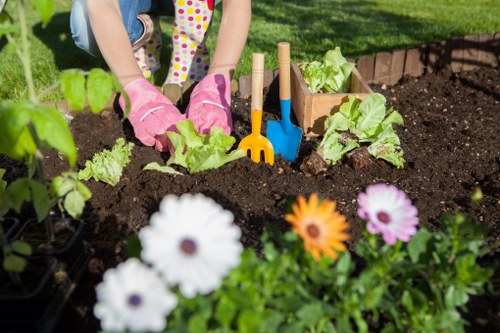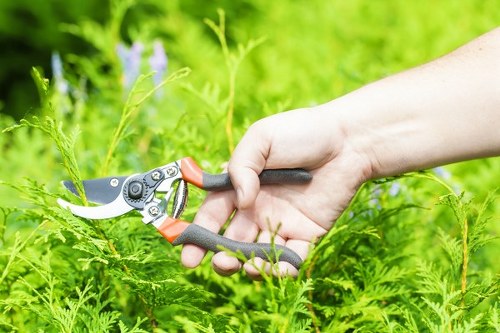Landscape Gardening in Temple: Transforming Outdoor Spaces into Serene Sanctuaries
Introduction to Landscape Gardening in Temple

Landscape gardening in Temple offers homeowners the opportunity to transform their outdoor spaces into beautiful and functional areas. Whether you have a sprawling backyard or a compact patio, landscape gardening can enhance the aesthetic appeal of your home while providing a serene environment for relaxation and entertainment.
In Temple, the climate and soil conditions are conducive to a variety of plant species, making it an ideal location for diverse landscape gardening projects. From native plants that thrive in the region to exotic varieties that add unique touches, the possibilities are endless.
Moreover, landscape gardening goes beyond mere aesthetics. It plays a crucial role in improving air quality, reducing soil erosion, and promoting biodiversity. By carefully selecting plants and designing thoughtful layouts, gardeners can create ecosystems that support local wildlife and contribute to environmental sustainability.
Planning Your Landscape Garden

Effective landscape gardening begins with careful planning. Assessing your outdoor space, understanding your preferences, and setting a budget are essential steps in the planning process.
Assessing Your Space: Start by evaluating the size and shape of your garden area. Consider factors such as sunlight exposure, soil quality, and existing structures. This assessment will help you determine which plants will thrive and what design elements will best suit your space.
Setting Goals: Define what you want to achieve with your landscape garden. Are you looking to create a tranquil retreat, a vibrant entertainment area, or a low-maintenance yard? Clear goals will guide your design choices and plant selections.
Choosing the Right Plants

Selecting the right plants is crucial for a successful landscape garden in Temple. Consider factors such as climate compatibility, maintenance requirements, and aesthetic appeal.
Native Plants: Native plants are well-suited to the local climate and soil conditions. They require less water and maintenance, making them an eco-friendly choice.
Exotic Plants: For those seeking unique and visually striking landscapes, exotic plants can add a distinctive flair. Ensure that they are compatible with the Temple climate or provide necessary care to thrive.
- Flowers: Roses, marigolds, and sunflowers can add color and vibrancy.
- Shrubs: Boxwood, hydrangeas, and azaleas provide structure and texture.
- Trees: Maple, oak, and Japanese cherry trees can serve as focal points.
Design Elements in Landscape Gardening

Incorporating various design elements can enhance the functionality and beauty of your landscape garden. These elements include pathways, water features, lighting, and seating areas.
Pathways: Well-designed pathways guide visitors through the garden and connect different areas. Materials such as stone, gravel, or wood can complement the overall aesthetic.
Water Features: Fountains, ponds, and waterfalls add a soothing ambiance and attract wildlife. They can also serve as focal points in the garden design.
- Lighting: Proper lighting extends the usability of your garden into the evening and highlights key features.
- Seating Areas: Comfortable seating arrangements provide spaces for relaxation and socializing.
Maintaining Your Landscape Garden

Maintenance is key to ensuring that your landscape garden remains attractive and healthy. Regular care practices include watering, pruning, fertilizing, and pest control.
Watering: Adequate watering is essential, especially during dry seasons. Implementing efficient irrigation systems can conserve water and ensure consistent moisture levels.
Pruning: Regular pruning helps maintain the shape and health of plants. It removes dead or diseased branches and encourages new growth.
- Fertilizing: Providing the right nutrients supports plant growth and resilience.
- Pest Control: Monitoring for pests and using eco-friendly control methods helps protect your plants.
Benefits of Landscape Gardening

Landscape gardening offers numerous benefits, both aesthetic and environmental. It enhances the visual appeal of your property, increases property value, and creates inviting outdoor spaces for various activities.
Environmentally, well-planned gardens contribute to better air quality, reduce carbon footprints, and support local ecosystems. Additionally, gardens can provide shade and cooling, mitigating the effects of urban heat islands.
For homeowners, a beautiful landscape garden serves as a personal sanctuary, a place to unwind, and a setting for family gatherings and social events.
Trends in Landscape Gardening in Temple

Keeping up with the latest trends can inspire your landscape gardening project. Currently, sustainable gardening practices, native plantings, and smart irrigation systems are gaining popularity in Temple.
Sustainable Practices: Incorporating rain gardens, composting, and xeriscaping promotes environmental stewardship and reduces maintenance efforts.
Native Plantings: Emphasizing native flora supports local wildlife and ensures plants thrive with minimal intervention.
- Outdoor Living Spaces: Designing spaces with functional furniture and amenities for outdoor entertaining.
- Vertical Gardening: Maximizing space by growing plants vertically on walls and structures.
Hiring a Professional Landscape Gardener

While DIY landscaping is possible, hiring a professional landscape gardener can ensure your garden is expertly designed and maintained. Professionals bring knowledge of plant selection, design principles, and maintenance techniques that can elevate your garden.
A professional landscaper can also provide tailored solutions that align with your vision and address specific site challenges, such as poor soil or limited space.
Choosing the Right Professional: Look for experienced gardeners with a portfolio of previous work, positive reviews, and relevant certifications. Clear communication and a shared vision are essential for a successful collaboration.
Cost Considerations in Landscape Gardening

Budgeting is an important aspect of landscape gardening. Costs can vary based on the size of the project, plant selections, design complexity, and whether you hire professionals.
Planning Your Budget: Determine how much you are willing to spend and allocate funds to different aspects such as plants, materials, and labor.
Cost-Saving Tips: Opt for native plants, reuse existing materials, and phase your project to spread out expenses over time.
- DIY vs. Professional: Weigh the benefits of doing it yourself against the expertise and time saved by hiring professionals.
- Long-Term Investments: Invest in quality materials and plants that will reduce maintenance costs and increase longevity.
Seasonal Considerations in Temple

Temple's climate influences the timing and type of gardening activities. Understanding seasonal changes helps in planning plantings and maintenance tasks effectively.
Spring: Ideal for planting new plants, preparing soil, and starting maintenance routines. It's also a good time to incorporate vibrant spring flowers.
Summer: Focus on watering, mulching, and protecting plants from extreme heat. It's also a time for maintaining lawns and managing pests.
- Autumn: Perfect for planting perennials, pruning trees, and preparing the garden for winter.
- Winter: Engage in garden planning, tool maintenance, and incorporating evergreen plants for year-round greenery.
Eco-Friendly Landscaping Practices

Incorporating eco-friendly practices in landscape gardening not only benefits the environment but also creates a healthier garden. Sustainable gardening practices include composting, rainwater harvesting, and using organic fertilizers.
Composting: Recycling organic waste into compost enriches the soil and reduces the need for chemical fertilizers.
Rainwater Harvesting: Collecting and utilizing rainwater for irrigation conserves water and ensures plants receive natural moisture.
- Organic Fertilizers: Using natural fertilizers promotes soil health and reduces chemical runoff.
- Mulching: Applying mulch retains soil moisture, suppresses weeds, and improves soil quality.
Incorporating Hardscaping Features

Hardscaping elements like patios, decks, and retaining walls complement the softscape and add functionality to your garden. These features provide structure and define different areas within your landscape.
Patios and Decks: Ideal for outdoor dining, lounging, and entertaining. Materials such as stone, wood, and concrete offer durability and aesthetic appeal.
Retaining Walls: Effective for managing slopes and preventing soil erosion while adding a decorative touch.
- Fire Pits: Create a cozy gathering spot for warmth and socializing.
- Walkways: Guide visitors through the garden while adding visual interest.
Creating a Wildlife-Friendly Garden

Designing a wildlife-friendly garden supports local biodiversity and creates a vibrant ecosystem. Incorporate plants that provide nectar, food, and shelter for various species.
Pollinator Gardens: Planting flowers that attract bees, butterflies, and other pollinators promotes healthy plant reproduction and supports the food chain.
Bird-Friendly Features: Install birdhouses, feeders, and water sources to attract and support local bird populations.
- Habitat Diversity: Use a mix of plant types and structures to cater to different wildlife needs.
- Native Species: Native plants are more likely to attract local wildlife and thrive in the environment.
Innovative Landscaping Techniques

Adopting innovative techniques can set your landscape garden apart. Techniques such as vertical gardening, xeriscaping, and permaculture offer creative solutions for modern gardening challenges.
Vertical Gardening: Maximizes space by growing plants upwards on trellises, walls, or specially designed structures, ideal for small gardens.
Xeriscaping: Focuses on water-efficient landscaping, reducing the need for irrigation through drought-tolerant plants and smart design.
- Permaculture: Emphasizes sustainable and self-sufficient garden ecosystems by mimicking natural processes.
- Smart Irrigation: Utilizing technology to optimize watering schedules and conserve water resources.
Enhancing Privacy in Your Garden

Privacy is a desirable feature in many landscape gardens, allowing homeowners to enjoy their outdoor spaces without unwanted attention. Strategies to enhance privacy include the use of fencing, hedges, and strategically placed structures.
Hedges and Shrubs: Dense plantings like arborvitae, boxwood, and privet provide natural barriers that block views and create secluded areas.
Fencing: Installing fences made of wood, metal, or composite materials can effectively delineate property boundaries and enhance privacy.
- Screening Structures: Pergolas, trellises, and gazebos can serve as both design elements and privacy screens.
- Trellis Plants: Climbing plants like ivy or clematis growing on trellises add greenery while providing a visual barrier.
Seasonal Planting Strategies

Implementing seasonal planting strategies ensures that your garden remains vibrant and healthy throughout the year. Planning for seasonal changes can help in selecting the right plants and optimizing garden performance.
Spring Planting: Focus on perennials, bulbs, and annuals that bloom in the spring. This season is ideal for establishing new plants and preparing beds for the growing season.
Summer Care: Maintain your garden with regular watering, mulching, and pest management. Choose heat-tolerant plants that can thrive during the hotter months.
- Fall Preparations: Plant hardy perennials and prepare the garden for winter by pruning and adding compost.
- Winter Protection: Protect sensitive plants with covers and plan your spring garden layout.
Incorporating Sustainable Practices

Sustainability is a key consideration in modern landscape gardening. By adopting eco-friendly practices, you can create a garden that is both beautiful and environmentally responsible.
Composting: Transform organic waste into nutrient-rich compost to improve soil health and reduce landfill waste.
Rainwater Harvesting: Collect rainwater for use in irrigation, reducing reliance on municipal water sources and conserving water.
- Solar Lighting: Utilize solar-powered lights to illuminate your garden sustainably.
- Recycled Materials: Incorporate recycled or reclaimed materials in garden structures and paths.
Final Thoughts on Landscape Gardening in Temple

Landscape gardening in Temple is a rewarding endeavor that combines creativity, sustainability, and functionality. By thoughtfully planning your garden, selecting the right plants, and incorporating diverse design elements, you can create an outdoor space that enhances your home's beauty and provides a peaceful retreat.
Whether you choose to embark on a DIY project or hire a professional landscaper, the key to a successful landscape garden lies in attention to detail, ongoing maintenance, and a passion for gardening.
Ready to transform your outdoor space? Contact us today to begin your landscape gardening journey and bring your vision to life.

